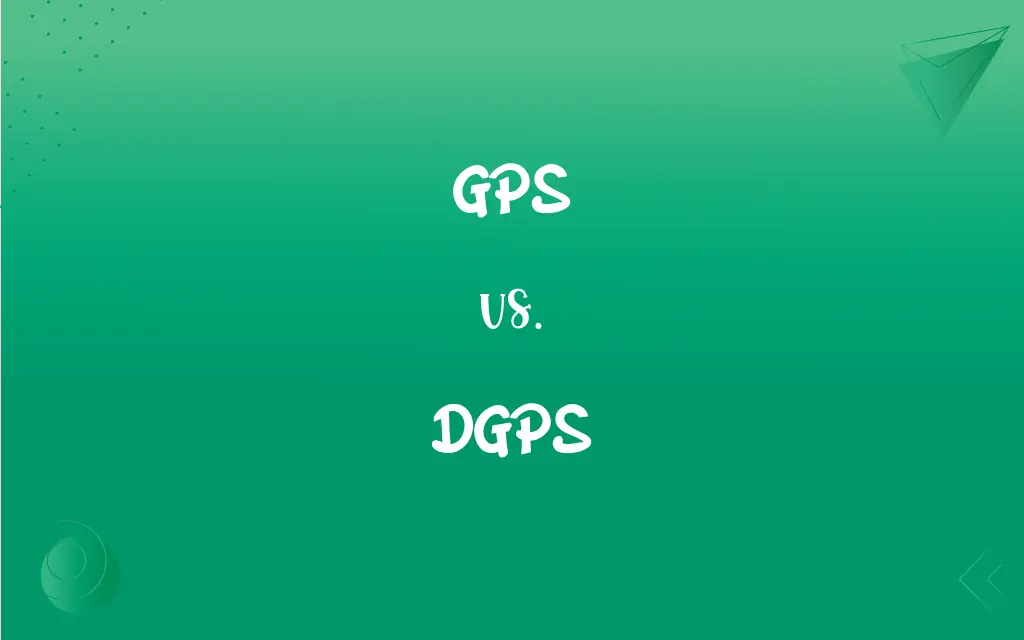GPS vs. DGPS: What's the Difference?
Edited by Aimie Carlson || By Janet White || Published on February 7, 2024
GPS provides location data using satellites, whereas DGPS enhances this accuracy by correcting GPS signals using ground-based reference stations.

Key Differences
GPS (Global Positioning System) is a satellite-based navigation system that provides location and time information globally. This system relies on a network of satellites orbiting the Earth. DGPS (Differential GPS), on the other hand, is an enhancement to GPS that provides improved location accuracy. DGPS uses a network of fixed ground-based reference stations to broadcast the difference between the positions indicated by the satellite systems and the known fixed positions.
GPS operates independently and can provide geo-spatial positioning worldwide. It is maintained by the United States government and is freely accessible to anyone with a GPS receiver. In contrast, DGPS requires additional infrastructure, including reference stations on the ground, to correct GPS signal errors. This makes DGPS more accurate than standard GPS, reducing errors to less than a meter in many cases.
The accuracy of GPS can be affected by factors like signal blockage, atmospheric conditions, and satellite geometry. Typically, GPS has an accuracy of about 15 meters. DGPS, however, mitigates these issues by providing corrections to the GPS signals, thereby enhancing the accuracy significantly, often to within 1 to 3 meters.
GPS is widely used in various applications, from navigation systems in vehicles to tracking and mapping devices. Its usability and accessibility have made it a standard technology in many industries. DGPS, being more accurate, is often used in applications where precision is crucial, such as surveying, agriculture, and marine navigation.
The implementation of GPS is simpler and more cost-effective compared to DGPS. GPS devices are ubiquitous and used in smartphones, cars, and many other consumer electronics. DGPS, while offering higher precision, requires additional equipment and setup, making it more complex and expensive.
ADVERTISEMENT
Comparison Chart
Accuracy
Typically around 15 meters
Often within 1 to 3 meters
Dependency
Operates independently
Relies on ground-based stations for accuracy
Cost and Complexity
Less expensive, simpler to implement
More costly, requires additional setup
Usage
Widely used in consumer electronics, navigation
Used in precision-required fields like surveying
Signal Correction
No correction mechanism
Corrects GPS signals for higher accuracy
ADVERTISEMENT
GPS and DGPS Definitions
GPS
A satellite-based navigation system providing global location and time information.
I used my phone's GPS to navigate through the city.
DGPS
An advanced form of GPS offering higher location precision.
In precision agriculture, farmers utilize DGPS for accurate field mapping.
GPS
Technology enabling global positioning for navigation and mapping.
The delivery driver used GPS to find the fastest route.
DGPS
An enhanced GPS system providing improved accuracy using ground reference stations.
Surveyors use DGPS for precise land measurements.
GPS
A global satellite system that offers location services.
During our road trip, GPS was invaluable for finding points of interest.
DGPS
GPS with corrections from ground stations for better accuracy.
The construction team employed DGPS for exact positioning of the infrastructure.
GPS
A system that determines one's precise position on Earth.
Hikers often rely on GPS to avoid getting lost in the wilderness.
DGPS
An enhanced navigational system augmenting GPS signals for greater accuracy.
DGPS played a crucial role in the archaeological survey's success.
GPS
A tool for geolocation and tracking using satellite signals.
With GPS tracking, the company monitors its fleet of trucks.
DGPS
A system that reduces GPS errors by using fixed ground-based reference points.
The harbor uses DGPS to guide ships safely to their berths.
GPS
A navigational system involving satellites and computers that can determine the latitude and longitude of a receiver on Earth by computing the time difference for signals from different satellites to reach the receiver
FAQs
Is GPS available worldwide?
Yes, GPS provides global coverage.
What is GPS?
GPS is a satellite-based navigation system providing location and time information globally.
Are GPS services free?
Yes, GPS is freely accessible to anyone with a GPS receiver.
Can DGPS be used anywhere?
DGPS requires proximity to a reference station, so its use is limited to areas with these stations.
How does DGPS improve upon GPS?
DGPS uses ground-based reference stations to correct GPS signal errors, enhancing accuracy.
How accurate is DGPS compared to GPS?
DGPS is often accurate to within 1 to 3 meters.
Can weather affect GPS accuracy?
Yes, factors like atmospheric conditions can impact GPS accuracy.
Does DGPS work better in urban areas?
DGPS can be more effective in urban areas due to the presence of reference stations.
Do smartphones use GPS or DGPS?
Most smartphones use GPS.
Who maintains the GPS system?
The United States government maintains the GPS system.
Is special equipment needed for DGPS?
Yes, DGPS requires additional ground-based reference stations.
How does DGPS benefit maritime navigation?
DGPS provides enhanced accuracy crucial for safe marine navigation.
What is the typical accuracy of GPS?
The accuracy of GPS is generally about 15 meters.
Are there any alternatives to GPS?
Yes, other systems like GLONASS (Russia) and Galileo (EU) are alternatives to GPS.
Is DGPS used in aviation?
Yes, DGPS is used in aviation for precise navigation and landing.
Can I upgrade my GPS system to DGPS?
Upgrading to DGPS requires additional hardware and access to a reference station network.
Can GPS be used for tracking?
Yes, GPS is widely used for tracking vehicles, assets, and individuals.
Why is DGPS important in surveying?
DGPS provides the high precision required for accurate land and infrastructure surveying.
What are the main applications of GPS?
GPS is used for navigation, mapping, timing, and tracking.
How does terrain affect GPS signals?
Mountains, buildings, and dense foliage can block or reflect GPS signals, affecting accuracy.
About Author
Written by
Janet WhiteJanet White has been an esteemed writer and blogger for Difference Wiki. Holding a Master's degree in Science and Medical Journalism from the prestigious Boston University, she has consistently demonstrated her expertise and passion for her field. When she's not immersed in her work, Janet relishes her time exercising, delving into a good book, and cherishing moments with friends and family.
Edited by
Aimie CarlsonAimie Carlson, holding a master's degree in English literature, is a fervent English language enthusiast. She lends her writing talents to Difference Wiki, a prominent website that specializes in comparisons, offering readers insightful analyses that both captivate and inform.































































